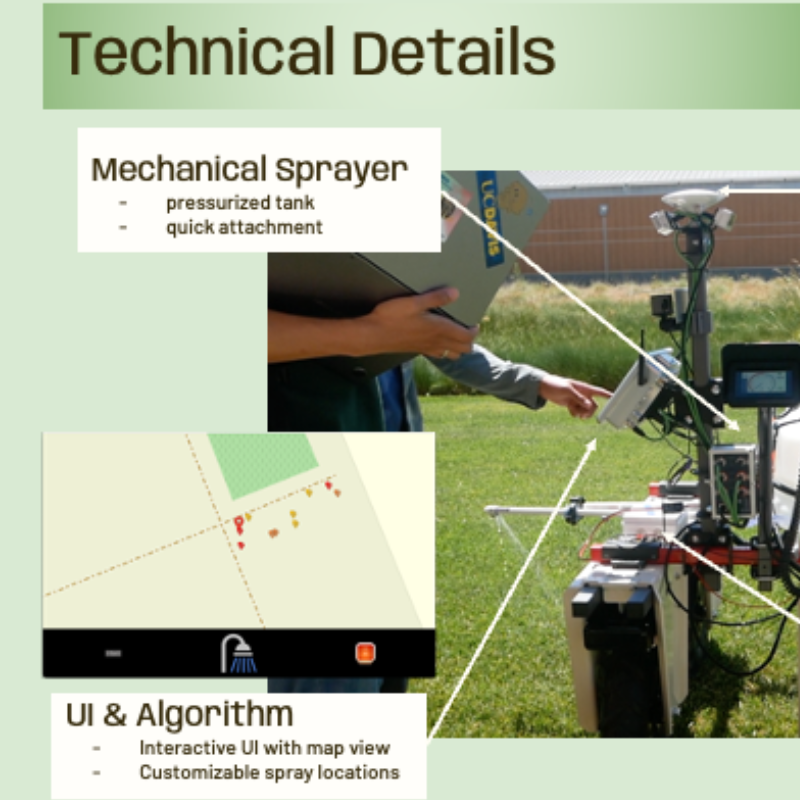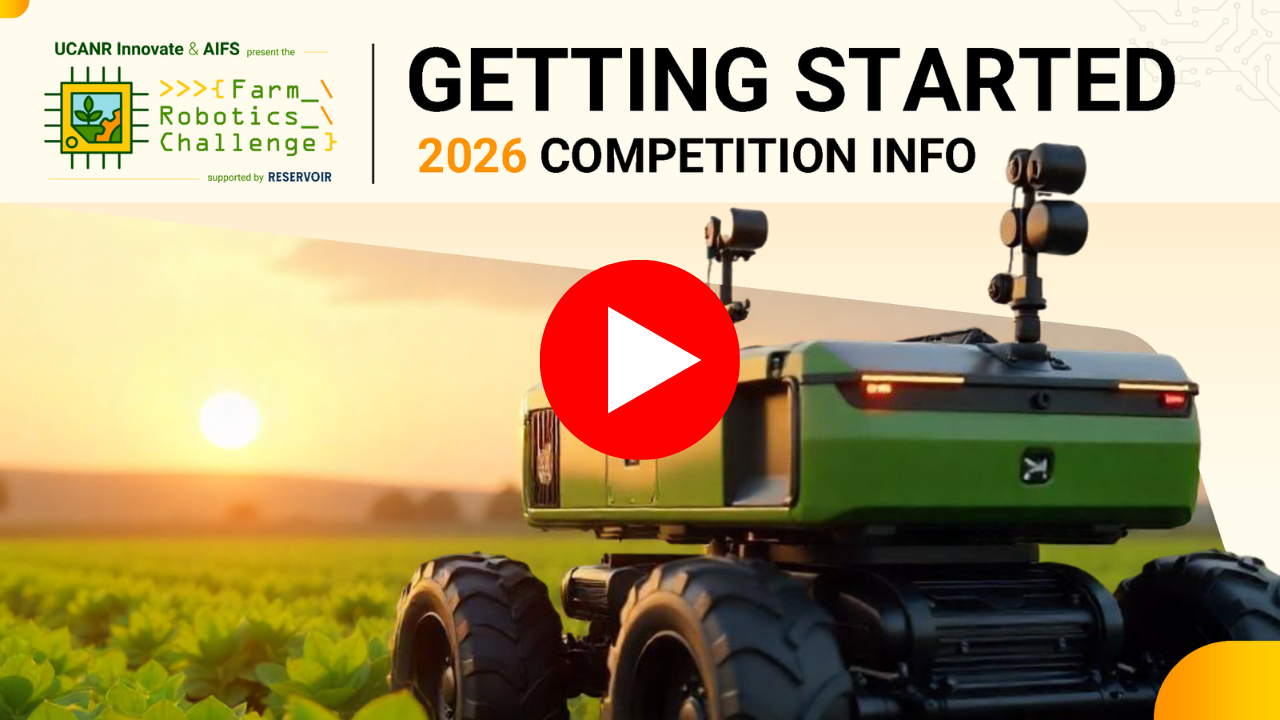Welcome to the Challenge
Are you ready to help shape the future of farming?
This competition was founded on a bold vision: to ignite curiosity, fuel innovation, and empower students and growers to tackle real-world challenges with the power of AI, automation, and robotics.
Together, we’re reimagining what agriculture can be, building a global community of changemakers dedicated to feeding the world more sustainably. Whether you’re a student eager to make an impact, a professor guiding the next generation, a university leader, an industry innovator, or simply someone who believes in the promise of technology and agriculture—you belong here.
Watch the video below to discover the inspiration behind our mission and hear first-hand stories from participants who are shaping the next generation of agriculture.
Join us and be part of the revolution transforming the future of farming.
Participation
Scroll through the slides below to learn more about the competition. Sign up for our mailing list to get updates and announcements at the button below.
If your team is ready to register please have your team lead fill out and submit the registration form.
Get informed on all aspects of the Challenge. View the information from 2026 Info Session Webinar held on September 10, 2025. Click the button below to access and download the slide deck or scroll down to watch the full recording of the session. Note, we have added additional prizes and awards since the time this webinar was recorded, be sure to check our Prizes page for the latest info.
Click on the image below to view the 2026 Info Session Webinar .
Four Phases of the Competition
-

Team Formation
Assemble your multidisciplinary team and submit your intent to compete via the registration button on the website.
-

Research & Proposal
Conduct market research to identify a real-world agricultural problem and submit a project proposal.
-

Development & Testing
Engage in the coding, fabrication, and initial testing of your robotic solution.
-

Presentation
Refine your prototype and prepare a written report and video presentation of your solution in action. Our expert panel of judges will review and select the winning teams during a virtual awards ceremony.
KEY DATES & DEADLINES
2026 Competition
| Milestone | Date |
|---|---|
| Registration | Opens August 1 |
| Team Formation Period | August - October |
| Project Proposals Due | November 14, 2025 |
| Development & Testing Period | November 2025 - April 2026 |
| Final Projects Due | May 3, 2026 |
| Awards Ceremony | May 21, 2026 |
Frequently Asked Questions
-
The challenge is intended for students enrolled at 2-year or 4-year colleges and universities, as well as trade or technical schools. Graduate students are encouraged to participate, provided that they do not make up more than 50% of a team’s members.
In addition, middle and high school students (grades 7-12) based in the US can participate through our Academy Program.
Due to compliance requirements related to U.S. export control laws and guidance from the University of California Office of the President (UCOP), participation is restricted in some cases. Specifically, students enrolled at institutions located in, or directly affiliated with, certain countries designated as sensitive under current U.S. regulations are not eligible to participate.
At present, this restriction applies to students from the following countries:
China
Iran
North Korea
Russia
Qatar
Saudi Arabia
United Arab Emirates
We recognize this limitation may be disappointing to some, and we emphasize that this policy is not a reflection on individual students or their abilities, but rather a matter of compliance with U.S. regulatory requirements.
-
A team advisor can be a faculty member, graduate student, or school staff member.
-
Yes, teams may be formed with students from more than one institution, subject to the following limitations:
Lead Institution:
One university or college must be designated as the lead institution. This institution will serve as the primary point of contact and will be responsible for registering the team, submitting deliverables, and managing overall coordination. Should the team win an award, the award (cash prize/travel stipends) will be directed to the lead institution.Number of Partner Institutions:
The lead institution may collaborate with up to two additional institutions. This means a team can include students from a maximum of three institutions in total (the lead plus two partners).Types of Institutions:
While there is flexibility in the types of institutions that can partner, a common arrangement might be:A 4-year university partnering with a 2-year community college, or
Two or three 4-year universities/colleges with existing research or academic partnerships.
Advisors:
Academic advisors from all participating institutions are welcome and encouraged to support the team. -
Teams are free to use technologies of their choice including unmanned ground vehicles (UGV), unmanned aerial vehicles (UAV or drones), attachments, control systems, sensors, and software. Designs can include a mix of commercially available gear and/or custom builds. The emphasis is on the creative, innovative, and novel use of technology to solve pressing issues in agriculture.
-
There is no fee to enter and participate in the challenge.
-
We currently do not have central funding to provide teams with grants. It is up to each team to procure their own equipment and budget for project related expenses.
-
View information on the Amiga robot at Bonsai Robotics.
You can also reach out to:
Linda McNair, VP of Marketing
linda.mcnair@bonsairobotics.ai
You can also access technical information for the Amiga robot on our resources page.
-
The competition follows the academic calendar year. Team formation and problem identification begin in the fall. During winter and spring, teams work on development, field testing and compile their final reports for submission towards the beginning of May. Exact dates listed above.
-
Teams compete for prestigious prizes and exclusive opportunities to present their innovations at leading industry conferences. In 2026, more than $100,000 in prizes will be awarded. Visit our prizes page to explore the rewards available in this year’s competition.
-
Yes, so long as each team is working on a unique problem.
Choose the top projects that best represent your school.
Technology can also be shared across multiple teams.
-
Yes, so long as your project did not win an award from a prior competition year.
We recognize there is a learning curve and some projects may take more than one year to complete. We encourage you to iterate on your design and continue to refine and improve it as needed.
-

